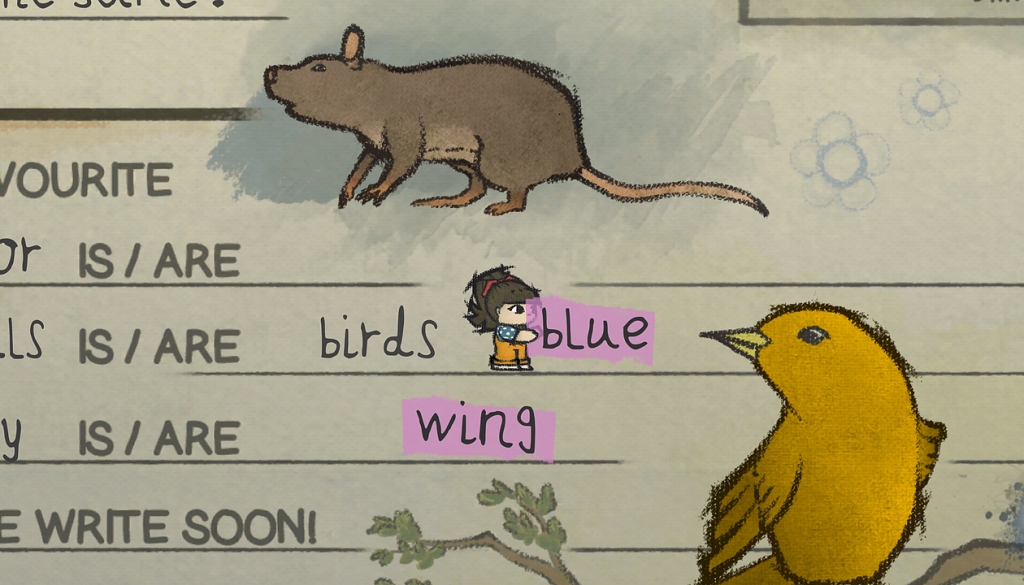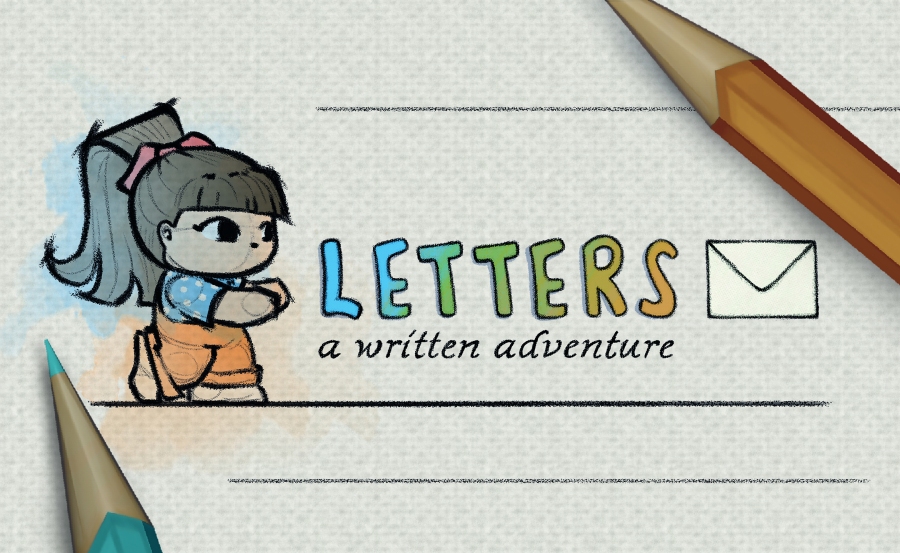By Thilo Thelitz
The upcoming Zurich-made video game Letters is “a story about a girl discovering the power of words,” but not in the way you might think as an English student. In the game, you play as Sarah, an 11-year old Swiss girl writing to her pen pal in Russia. You are shrunk down and literally move in between lines of text to pick up words and throw them at your surroundings in order to progress to the next level. For more background on the game and its development, I had an interview with one of the developers, Martina Hotz.

The game is partly crowdfunded through a Kickstarter campaign which has, at the time of writing, reached CHF 19’178 of its goal of CHF 20’000 with only few days left until it ends on November 23! The game is under development already, and you can download a demo. The glimpse of the game I got while playing the demo already transported me back to the days when I was but a young nerd. At the same time, the game mechanics are really quite unique, akin to a puzzle, and make for dynamic and fun gameplay. In a gaming landscape that often produces dark and gritty and tough worlds, it’s also nice to see a wholesome and sweet game like this. The Nintendo kid in me has always preferred the cheery and magical universes over the edgy ones. Lastly, I loved the little homages and references to different aspects of gaming culture that the Letters’ world is strewn with.”There’s a little bit of each of us in the story,” Martina says.

Development is in the hands of the three-woman team 5am Games. After working on tasks and graduating together, they banded together to make an idea they had during their education a reality. All of them studied Game Design at the Zürcher Hochschule der Künste, quite a unique program in Switzerland. When asked why she decided to take this path, Martina says, “When I was younger, I never knew what I wanted to do with my life. I just loved to have fun & be creative. I worked quite a few jobs in my early and mid-twenties, even became a massage therapist, but I always hated work. Every bit of it. When some friends of mine started studying at the ZHdK, I wanted to go there as well because it sounded like a lot of fun. I had no idea WHAT I wanted to study but I thought the ZHdK might be a good first step. So I went back to school for 3 years to get my Matura, worked and saved up some money and applied for the preparation course at the ZHdK. There I learned that being a game designer is an actual job and that even a person like me – who is really bad at Math – could become. Even though I was scared at first to end up in an unprofitable career, my friends convinced me to follow my interests and study game design. I never regretted my decision. Now I have the dream job I never knew existed in Switzerland.”
The team at 5am Games won a whole array of awards and went to an “accelerator program” in a Swedish cottage for two months before founding their new studio and going full-time (“It’s like the best summer camp ever”). They are somewhat of an anomaly, since female game developers are chronically disadvantaged and underrepresented in the industry.
According to the latest Developer Satisfaction Survey, 74% of game developers worldwide are men. In the same survey, around half of the respondents say they have witnessed or experienced inequality in the workplace. In 2018, news about an endemic sexist work culture at Riot, a 2’500-employee company, made a big splash. Connected to the issue of the small number of female developers is that women tend to be under- and misrepresented in the games themselves as well. At E3 this year, 21% of game protagonists were male while under 5% were female (most games give you the choice). Feminist Frequency, the writers of the linked article, are well-known for producing the YouTube series Tropes vs Women in Video Games, which criticizes games’ long-running and ubiquitous sexist representation of women.
Letters features a female protagonist (no gender choice is given), and from what has come out so far steers clear of any of the tropes discussed above. Games are an especially powerful medium when it comes to representation, as Martina explains: “Games are powerful because it puts you, the player, into the driver’s seat. You are the one who has to make the decisions instead of just observing someone else doing it. Having this amount of agency and power makes you care more about the story and characters so I’d like to think that games are particularly suitable to focus on complex and deep stories. So I think representation is important in all our media but games might have a bigger potential to make the message stick.”
No doubt, the all- female development team is in a great position to deliver a narrative with a fair representation of women. It is even LBGT-friendly, which is noticeable when Sarah has to choose her “emo sweetheart.” The game gives you many choices for customizing that sweetheart, including a choice of gender. “What we do with Letters is the bare minimum. Making our protagonist bisexual made sense because it will play its part in normalizing it and it’s authentic because we are not a 100% straight studio,” Martina comments.

All three developers studied at the ZHdK (Martina: “our curriculum is one of the best world-wide”), which appears to place game development in the domain of the arts. Not everyone would agree with this idea. Film critics like Roger Ebert and Jonathan Jones have famously denied that games could be considered art in the way films are, and some designers like Hideo Kojima have agreed with that sentiment. When Shigeru Miyamoto (creator of Mario, Zelda, Donkey Kong) was asked about it, he said “I have never thought of games as a medium for storytelling.” Yet views are constantly changing around video games and their place in society and many people would object to those opinions. More and more games are being exhibited as art, for example in the Stadtmuseum Aarau, as well as here in Tampere, Finland, where I am currently studying, and even in the MoMA in New York. Martina says, “like books or films there are games that are considered art. I don’t see how they are different.” She adds that she has “a lot of love and respect” for Swiss studios and games.
The Victoria & Albert Museum in London exhibited the game Kentucky Route Zero alongside William Faulkner’s The Sound and The Fury in their exhibition Videogames: Design/Play/Disrupt. This draws attention to the way the game approaches storytelling. Some narrative-focused games, including Kentucky Route Zero, are non-linear and interactive. The player makes decisions which can affect the outcome of the story. Letters uses this kind of storytelling as well, to some extent. Usually, narratives in games either come in the form of text-heavy adventures or visual novels, or as almost cinematic games which do more visual storytelling. Both come in interactive and non-interactive flavors and it’s debatable which is better. Who knows, maybe literature students will study literary games in the distant future.
Art or not, Letters has the potential to be a beautiful video game that successfully transports players into a nostalgic world and lets them choose which path they want to take. It’s great to see another interesting game come out of the budding local game scene and have a positive impact on the industry and medium as a whole.
Letters is set to release on PC and Mac in the first half of 2021, with a mobile version following after that. You can visit the game and download the demo here.
The original article was published on Nov 20, 2019 and was updated with interview material on Dec 25, 2019.
